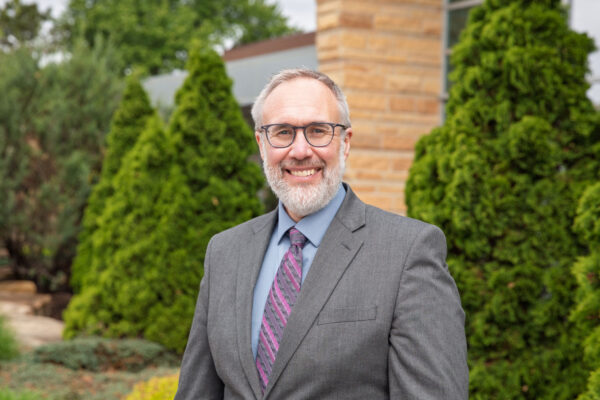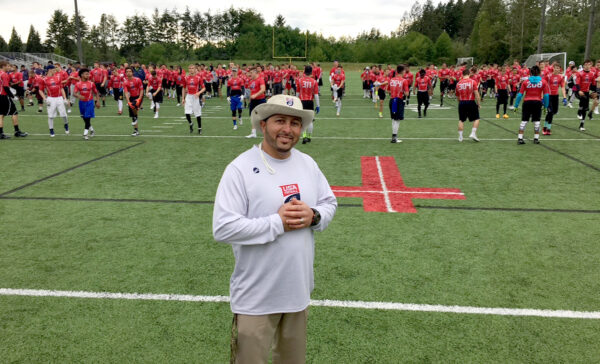By Sean Park
Many disabled students face distinct challenges in college writing assignments. Neil Simpkins, assistant professor in the School of Interdisciplinary Arts & Sciences, has been researching this subject since his time as a graduate student when he had to overcome these kinds of challenges, too.

It made him passionate about giving back to others through his research — research that earned him a travel award from the Conference on College Composition and Communication to share what he has learned with other experts in his field.
Unfortunately, due to the coronavirus, the conference scheduled for March in Wisconsin has been delayed.
Undeterred, Simpkins is planning another proposal to speak at CCCC in 2021 to ensure more of his colleagues learn what he has discovered about the intersections of disability and higher education, especially as they relate to composition and rhetoric.
A multi-dimensional experience
The focus of Simpkins’ research is how disabled students experience college writing and the rhetorical tactics they often use to navigate through college. His goal is to understand what additional work disabled students must do to be successful in their writing courses and higher education as whole.
Simpkins has identified four key dimensions to the college experience of disabled students, no matter their individual stories.
Emotional Reactions
Students often do a lot of work to manage their professors’ emotions around them having a disability and being in their classroom. One method students have used to deal with this is to talk about disabilities using select language or key words.
One person Simpkins interviewed, for example, said she told her professor she has a heart condition instead of using a formal diagnostic term. It sounded serious enough, the student explained, while at the same time wasn’t too unfamiliar.
“She feared that if she had used the real name of her condition,” said Simpkins, “that it could make the professor feel confused or nervous.”
Identity Issues
The balance of identifying oneself as having a disability or not is difficult for some students — both internally and with others more publicly. The issue that can arise when students deny or do not want to talk about a disability is that they often miss out on additional services they may need.
“I want students to realize that being disabled does not make them different in any way,” said Simpkins. “They’re in the same classrooms as everyone else and studying the same materials. If they can have access to an additional resource, why wouldn’t they take advantage of it?”
Time Management
Most writing classes in college are structured within set time frames, and the normal length of time may not be enough for some disabled students. Simpkins learned that the majority of the students who succeeded in these classes were able to do so because they had one-to-one conversations with their professor about adjusting time frames.
“Although students with different disabilities will need time management support in different ways, in general most students will eventually have to ask for more time to finish a project because of their disability,” said Simpkins. “Having that conversation with professors is critical in order for the student and teacher to be on the same page.”
Writing Process
High school students are commonly taught a five-step process (pre-writing, writing, revision, editing and publishing) for creating an essay from start to finish. Simpkins observed in his research that it was hard for students with certain disabilities to fit their story into this specific format.
Students with attention deficit hyperactivity disorder, for example, may not need to do the pre-writing phase. Rather, they may need to spend more thinking through the topic and then talking about their thoughts out loud with someone else.
The impact of mentoring
For most students who have a disability, a lot of the extra work identified in Simpkins’ research is attempted or accomplished alone. One powerful way faculty can address this issue is by fostering greater communication and trust with individual students.
Indeed, the talk Simpkins had planned to give last month, “Ethical Teaching with/across Difference,” was focused on methods that foster rich mentorship relationships between teacher and student.
His desire then — and still now — is to remind fellow teachers how important the roles they play can be for students with disabilities. “How can we cultivate openness with students,” he asks, “instead of feeling the top-down structure you find in a lot of classrooms?
“For faculty who are interested in being a good mentor, using things like the syllabus as a way to talk through and negotiate different aspects of the classroom will help both sides be on the same page,” said Simpkins. “Also, it’s important that faculty know what resources are available for disabled students so they can help guide them the right way.”
Making critical connections
One student interviewed for Simpkins’ research reported that simply having to negotiate his disability access with professors at the start of each quarter contributed greatly to his success as a student. When the professors are flexible and perceptive in these moments, the student said, it provided him an opportunity to build a relationship which he would not have had if he didn’t have the access conversations.
“Interactions like that can be really meaningful for students, and I want professors to understand that,” said Simpkins.
Since his arrival at UW Bothell in 2019, Simpkins says has been impressed with how active UW Bothell’s disability services team is.
“Often, at other institutions, disability services don’t have a model for suggesting accommodations around writing,” said Simpkins. “The suggestions here already align up a lot with what I believe is the right way, and so I’m super excited to continue to be a part of that.”
Note: May is Mental Health Awareness Month – for more information check out UW Bothell‘s disability resources for students and the Counseling Center.


